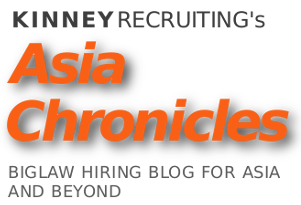One question I often get from candidates is how easy it will be to return back to the States after spending a few years in Asia. It’s a valid question – while an Asia-based practice and a US-based practice share many similarities, it’s not a completely overlapping skill set. Many hiring partners express a strong preference for candidates with Asia experience not simply because of the “regional ties” factor, but because an M&A/FDI deal run out of China has its own unique issues. There is a learning curve, and a US-based M&A associate unfamiliar with Asia deals will be at the bottom of that curve. I occasionally encounter a law firm which will take a class year off of an impressive candidate with top credentials because such candidate lacks Asia-specific experience.
The skill set overlap is an issue for capital markets practices as well, although it’s not typically an issue in hiring. Many law firms in Asia focus exclusively on unregistered (Regulation S/144A) offerings, whereas capital markets practices in the US focus mainly on registered offerings. There’s a large chunk of that securities redbook that you’re leaving unthumbed if all of your deals are unregistered offerings! There are certain kinds of capital markets transactions that you just won’t get much of in the US. A typical domestic capital markets practice won’t see many Islamic bond offerings or sovereign debt offerings, but these types of transactions could be very common in a Singapore capital markets practice.
After spending a few years in Asia doing Asia transactions it’s natural to think that your US-specific skill set would fall into disrepair, but US firms don’t see things that way. In a warm economy it is easy to move from Asia back to the States, especially if the move is from Asia Biglaw back to US Biglaw. In 2007 and 2008, we helped a number of US associates in Asia move back to their desired markets in the US.
Today we are working with some associates who are seeking to do the same, and while these candidates are considered competitive by their target firms, the lack of hiring in the US makes a lateral US move difficult, whether the candidate comes from Asia or from down the street.
The US economy has lagged far behind the Asian economies in terms of recovery. There are much less M&A and capital markets openings in the major US markets than there are in Asia in proportion to the number of competitive candidates on the market. Economists are still pessimistic on the prospects for recovery in the near term, with some even predicting a double-dip or a long, drawn out “lost decade” of little economic growth.
From our vantage point, the NY markets are at the moment where the Asia markets were at the midpoint of 2009 – some firms are beginning to interview and express an interest in hiring, but it is very difficult for even the top candidates to land a spot. There is a steadily growing number of openings in NYC, but the number of open spots, while increasing by the month, is far less than before the downturn. Optimistically, there are many more openings in NYC now than there were a few months ago. However, finding a Biglaw position in NYC is very difficult for all but the most highly qualified of candidates in either Asia or NYC. Laid off candidates have had some success in lateraling to government positions or smaller law firms in New York or New Jersey, but there is virtually no chance for a Biglaw layoff to make his or her way back into a Biglaw firm. For attorneys seeking to move to the West Coast, hiring in California for corporate associates is lagging far behind hiring in New York.
Trends in more regional markets (such as Texas) are as follows: while needs have increased in major non-NY markets in 2010 – especially over 2009 – firms can still afford to be very picky. Candidates are often asked to meet over multiple interviews and firms are meeting with numerous candidates over the course of several months before making a hiring decision. Corporate hiring is lagging well behind other practice groups, but mid-level associates who have run deals and have hard capital markets experience are the most attractive.
The most marketable associates are those with national and international experience, i.e., those from top law schools who are lateraling from elite firms without an office in the candidate’s desired region. For example, an associate lateraling to Houston might be more competitive coming from a firm not often seen on a Texas resume – such as Cleary, Covington or Kirkland – and are moving to such region because of a compelling personal reason, such as family.
Please don’t hesitate to contact Robert, Robert or Alexis at asia@kinneyrecruiting.com for any questions about moving to, within, or back home from Asia.
Related Posts:
- None Found
